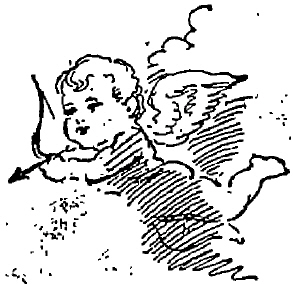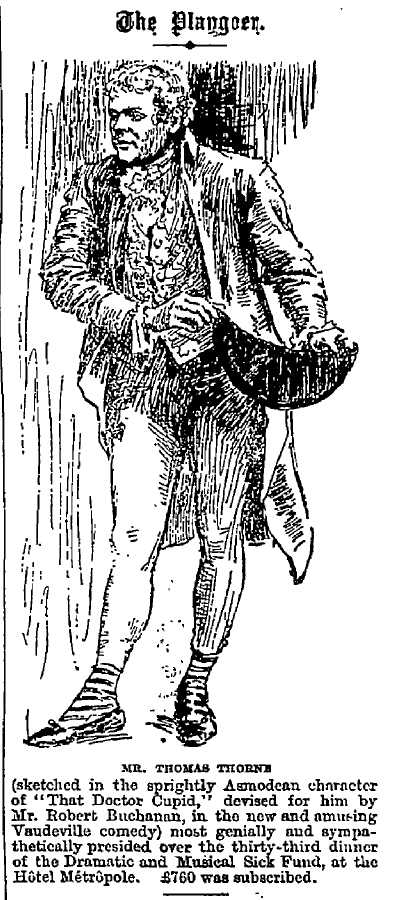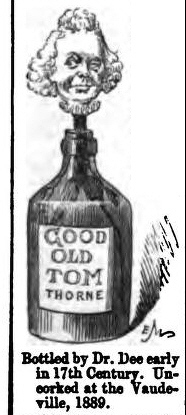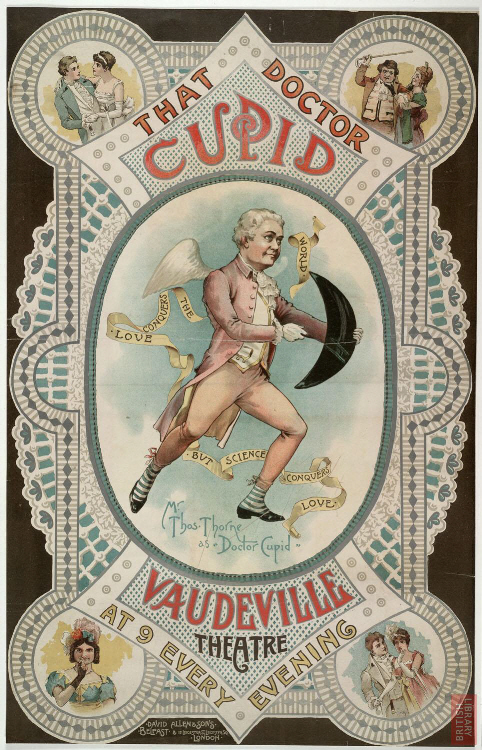|
Play List: 4. Corinne 7. The Mormons 9. Lucy Brandon 10. Storm-Beaten 11. Lady Clare 13. Bachelors 14. Constance 15. Lottie 16. Agnes 17. Alone in London 18. Sophia 19. Fascination 20. The Blue Bells of Scotland 21. Partners 24. Angelina! 25. The Old Home 26. A Man’s Shadow 27. Theodora 29. Clarissa 30. Miss Tomboy 32. Sweet Nancy 33. The English Rose 36. Marmion 37. The Gifted Lady 38. The Trumpet Call 39. Squire Kate 40. The White Rose 42. The Black Domino 44. The Charlatan 45. Dick Sheridan 47. Lady Gladys 48. The Strange Adventures of Miss Brown 49. The Romance of the Shopwalker 52. Two Little Maids from School ___ |
|
ROBERT WILLIAMS BUCHANAN (1841 - 1901) |
|
|
|
|
|
|
|
|
THEATRE REVIEWS 23. That Doctor Cupid (1889) - continued
The Penny Illustrated Paper (26 January, 1889 - p.49) |
 |
|
“That Doctor Cupid” fills the Vaudeville with laughter; and the heart of merry Tom Thorne rejoices. He has never appeared gayer. No wonder! It’s surprising how blithe people can be when they reap a golden harvest. The fantastic new comedy of Mr. Robert Buchanan—succeeding a brace of the same author’s Old English comedies that will bear revival again and again—achieved such instant success at the Vaudeville trial matinée that Mr. Thorne was amply justified in placing “That Doctor Cupid” in the evening bill. Quite a round of merriment is provoked by “That Doctor Cupid.” Released, à la Asmodeus, from his bottle, Doctor Cupid soon twists his rheumatic joints into working order; spirits his young Cambridge friend away from his college den to the Bath Assembly Rooms; and makes every woman fall in love with his charge and with himself; finally re-uniting the sundered hearts of Harry Racket (crisply played with “vim” and freedom by vivacious Frank Gilmore) and Kate Constant (played to perfection by Miss Winifred Emery). If you want an evening of mirth, drop into the Vaudeville, and relish the unctuous fun and humour of Mr. Tom Thorne as Dr. Cupid, the capital character-sketch of Mr. Fred. Thorne as the splenetic and “dotty” uncle, and the gay gambols of the dear old maids at Bath. “That Doctor Cupid” is enacted in the most sprightly fashion by one and all. ___
The Theatre (1 February, 1889) “THAT DOCTOR CUPID.” New and Fantastic Comedy in three acts, by ROBERT BUCHANAN. |
|
|
|
If continuous laughter is any proof of a success, Mr. Thorne has surely secured one in “That Doctor Cupid.” Mr. Buchanan has rightly named his comedy fantastic, for it combines the supernatural with the every-day life of the beginning of this century. Whether the general public will be attracted by this strange mixture, which at times reminds us of “The Bottle Imp,” “Creatures of Impulse,” and even “The Sorcerer,” remains to be proved. Certainly the author sprung his mine for the introduction of the supernatural in a deft and clever manner. The scene opens in Harry Racket’s rooms at Cambridge. Their occupier is a young gentleman who has devoted his time to drinking and gambling, and has been compelled to have recourse to money-lenders. One of them, Plastic, has been summoned to supply his necessities, and advances him £200 on the condition that he purchases certain articles. These are duly sent in, and prove to be various stuffed beasts, birds, skulls, and sundry specimens preserved in spirits of wine in bottles. Harry is engaged to Kate Constant, a charming, artless girl, who evidently prefers a dashing fellow of those days to a milksop, and has given him all her heart. She calls with her aunt, Miss Bridget, just when Harry has heard from his uncle, Sir Timothy, a gouty hypochondriac, that he has discarded him on account of the evil reports of him. Kate declares she will be true to him despite all his misfortunes, but her aunt jumps at Harry’s generous offer to release her from her engagement so that she may marry the rich Lord Fungus. When they are gone Harry looks round on the bill discounter’s rubbish, and takes up a bottle to which is attached a label bearing a Latin inscription, that love conquers the world, but science conquers love. Harry says it is wealth that conquers love, and in a fit of rage dashes the bottle into the fireplace, a crash is heard, and there appears a strange figure dressed in Elizabethan costume, who announces himself as Love. He tells how, having fallen from high Olympus, he became an imp, and that an alchemist of Queen Elizabeth’s day had entrapped him, and sealed him down in the bottle. As a recompense to Harry for freeing him, he offers him his services; though he cannot give him wealth, he will, by his power over all creatures animate, bring him good luck, and secure him his uncle’s good graces and his sweetheart’s hand. And so they fly off to Bath, whither Kate is gone with her aunt, and where also is staying for the benefit of the waters Sir Timothy Racket, attended by his sycophantic, wheedling nurse, Mrs. Veale, whom he thinks of marrying. Here Doctor Cupid, introduced by Harry as his tutor, proceeds to try and put matters straight for his pupil, but Cupid is so elated by his release from long confinement that he mismanages matters. Possessed of his invisible bow and arrows, he shoots his darts astray. He makes Mrs. Bliss a comely young widow, whom Charles Farlow, Harry’s friend, has been worshipping for years, fall in love with Harry, so does Mrs. Veale, so does Miss Bridget, until at last Kate is bound to believe that her lover is a deceiver, and accepts Lord Fungus. Doctor Cupid is dismissed in disgrace and with a curse, but he will not accept his dismissal till he has mended affairs, so in the third act he draws the current of love of all the ladies on himself in a most amusing scene, and then diverts their affection into its proper channels. Kate is reconciled to Harry, Mrs. Bliss to Farlow, the duplicity of Mrs. Veale is unmasked, and Sir Timothy is cured of his ailments, and taught that the true happiness of the old is not in selfish matrimony for themselves, but in witnessing its blissful results in the young. Taking the characters as they stand in the programme that deserve special mention, Mr. Frederick Thorne was excellent as the irascible gouty Sir Timothy, and gave some charming little touches, particularly when Kate intercedes for her lover. Mr. Frank Gilmore was a fine, impulsive young fellow as Harry Racket, and shows that he is rapidly advancing in his profession. Mr. Cyril Maude’s characterisation of Charles Farlow, a stuttering beau, was a perfect gem in acting, and Mr. Thomas Thorne was full of high spirits and dry humour as Doctor Cupid. In the third act, when he is scarcely absent from the stage, his “go” and vivacity were irresistible. Miss F. Robertson played well as a maiden lady of a certain age. Miss Dolores Drummond hit off to a nicety the fawning, deceitful attendant on Sir Timothy, and forcibly betrayed her real character when exposed through Doctor Cupid’s spells. Pretty Miss Marion Lea was a captivating Widow Bliss, and Miss Winifred Emery was a frank, loving girl as Kate Constant. I was sorry to see Mr. Scott Buist had not more to do as Lord Fungus; he was thrown away on so small a part, and one which gave him no opportunities. Mr. F. Grove did not quite picture to us Beau King. Messrs. Nathan must be complimented on the costumes, which, designed by Karl, brought before us so vividly the appearance of our dandies and ball-room belles when George was King, and King ruled over Bath. “That Doctor Cupid” was placed in the evening bill on Thursday, January 17, 1889. ___
The New York Dramatic Mirror (2 February, 1889 - p.8) LONDON NEWS AND GOSSIP. LONDON, Jan. 17, 1889. Finding that Joseph’s Sweetheart was obviously near the end of her days or nights at the Vaudeville, Thomas Thorne and his faithful Alport hurried forward the preparation of That Doctor Cupid, a three-act piece which Robert Buchanan had written to order for them. Thorne has, or professes to have, a holy horror of first-night audiences, and has for some years past evaded their rough-and-ready criticism by giving his new productions a preliminary canter at a matinee performance. This plan is not without its advantages, if we are to assume—which I do not—that there is any truth in managerial statements about “wreckers” and “organized opposition” and the like. But on the other hand the verdict of a matinee audience is rarely a safe guide as to a play’s future. Thorne and Alport have reason on their side so far that all recent vaudeville successes were tried at a matinee to begin with, and being there favorably received were put into the evening bill forthwith; but there is no reason to believe these plays would not have succeeded just as well had they first seen the footlights at night instead of in the afternoon. On the other hand, many a play which has been received with rapture by matinees has fallen flat as ditchwater before the paying public, who, after all, are the real masters of the situation. That Doctor Cupid was on Monday afternoon received with enthusiasm from start to finish, and this being thus, it goes into the evening bill tonight. How long it will stop there I shouldn’t like to say. It is never safe to prophesy unless you know, you know, and the longer I live the more certain I am that it is, humanly speaking, impossible to predict with certainty whether the public will or will not catch on to a new play. Speaking according to my lights, I should say That Doctor Cupid is bright and clever enough to cause considerable satisfaction for an hour— or peradventure an hour and a quarter—but that it has neither vertebræ nor viscera sufficient to fit it for the resistance-piece of the evening. * * * Buchanan describes his work as “a new and fantastic comedy.” Fantastic it is beyond doubt, but not new, though the way in which R. B. has reshuffled the old cards is worthy of all praise. There is an “author’s note” on the programme setting forth that a suggestion for the present comedy has been found in Foote’s famous farce, The Devil Upon Two Sticks, which was produced with extraordinary success at the Haymarket in 1768. Foote’s play was, however, merely a satire on the medical profession, and, beyond supplying a leading incident of the first act, has (says Buchanan) nothing in common with the present comedy which is otherwise entirely original. While he was about it Buchanan might as well have gone a step farther and avowed his indebtedness to Le Sage, from whom in the first instance Foote copied, for indeed the first act of That Doctor Cupid bears far greater resemblance to Le Diable Boiteux than it does to The Devil Upon Two Sticks, but this by the way. Briefly the story is of an English scapegrace—an undergraduate at Cambridge—who borrows money at exorbitant interest, and has to take the balance in useless curios. Among these is a glass bottle with some monstrosity therein, and when presently the hapless student, overwhelmed with debt and despair, dashes his furniture about and finally smashes the aforesaid bottle—hey, presto! likewise thunder, lightning and smoke—out pops Asmodeus, now translated into Doctor Cupid. He wears a quaint Elizabethan costume and is perhaps barely a yard high on his first appearance, but presently he assumes the normal height of Thomas Thorne. Nor is he lame now, though he suffers greatly from rheumatic twinges, owing to his recent close confinement. Asmodeus or Cupid is supposed to have been shut up in the bottle for 300 years, and is bound to be the faithful servitor of his liberator. So away they go together—to Bath, of all places in the world, Cupid assuming the character of the young man’s tutor. Up to now the course of true love has run crooked, but under Cupid’s fostering care our hero and heroine are, of course, eventually made happy. Cupid’s method is singular. He makes his master irresistible in the eyes of all the women, and there is the devil to pay all round. But eventually the disagreeable old uncle who had disinherited him relents, and the disagreeable old maid who was the other stumbling-block does ditto and all ends happily. The blunders of Cupid in making the wrong people fall in love are the most amusing features of the piece. There is considerable osculation all the time, and, indeed, the tone of the whole business may, without exaggeration, be termed somewhat sultry. Thomas Thorne as Cupid, Fred Thorne as the old uncle, and Frank Gilmore (who is a son of Emily Thorne) as the young student, all played well and were warmly applauded. Cyril Maude gave us a very clever bit of character acting as a stuttering fop, and Winifred Emery and Marion Lea (two charming young ladies) and Fanny Robertson and Dolores Drummond rendered valuable assistance. The comedy is well staged and carefully mounted, the dresses of the end of the eighteenth century being reproduced with wonderful accuracy. ___
The Illustrated London News (2 February, 1889 - p.17) “THAT DOCTOR CUPID.” Was it not that inimitable and popular comedian and exemplary citizen, Mr. J. L. Toole (now moving the town to merry laughter as that peculiarly susceptible Cambridge dignitary, “The Don”), who some years ago appeared in an Asmodean play at the Adelphi? This was before the Vaudeville Theatre was thought of. Lacking freshness though the central idea of “That Doctor Cupid” may, Mr. Robert Buchanan has infused so much human nature and good-humour into the new fantastic comedy thus named that Vaudeville audiences are certain to be highly entertained by the amusing piece for many a night to come. Mr. Buchanan avows his indebtedness in some measure to Foote’s famous farce of “The Devil upon Two Sticks”; and Mr. Thomas Thorne doubtless feels infinitely obliged to the adroit dramatist for fitting him so well with the gay part of Doctor Cupid:— Cupid’s the Doctor who enters all portals, That arch Doctor Cupid himself, and the personages he sets by the ears on the Vaudeville stage, are faithfully sketched by Mr. J. Bernard Partridge. Tastefully costumed in the fashions worn at the early part of the century, the characters who frisk from Cambridge to Bath agreeably recall the gallant period of Beau Nash and of the Regent. Doctor Cupid is not shown in his somewhat Mephistophelean garb as he first appears to startle Harry Racket, the penniless undergraduate in love with a sweet Kate he is too poor to dare to marry. Mr. Thomas Thorne is portrayed in all the glory of his silken coat and hose as he discharges his unseen Cupid’s darts, and plays havoc with all hearts in the Bath Assembly Rooms, whitherto Doctor Cupid spirits away Harry Racket. Earnest, bright, and youthfully impulsive, the Harry Racket of Mr. Frank Gilmore is throughout admirable—quite worthy such sweet, fresh, animated, and thoroughly girlish acting as that of Miss Winifred Emery as the charming heroine Kate Constant, who has another string to her bow in Lord Fungus (Mr. Scott Buist). There is another pair of lovers excellently embodied also—that exceedingly comely and seductive young widow, Mrs. Bliss (Miss Marion Lea), after a variety of impediments are surmounted, mating with her stuttering admirer, Charles Farlow (Mr. Cyril Maude), whose impersonation is remarkably good. Round the young people are skilfully grouped a few older characters, one and all, of whatever class and age, subject to the throes and arrows of outrageous Cupid. Thus, much mirth is provoked by Dr. Cupid’s magic dealings with that querulous Malade Imaginaire, Sir Timothy Racket (Mr. Fred. Thorne), and with his designing housekeeper Veale (Miss Dolores Drummond), and likewise with old-maidish Miss Bridget Constant (Miss F. Robertson). “That Doctor Cupid” brings his diverting legerdemain appropriately to a happy close on St. Valentine’s Day; and the pleased audience is disposed to agree with the author that— Though sometimes he blunders, ___
The Colonies and India (6 February, 1889 - p.26) Mr. Arthur Garner, of the well-known firm of Messrs. Williamson, Garner & Musgrove, has purchased of Mr. Thorne, for a considerable sum of money, the Australian rights of Robert Buchanan’s clever and successful comedy, “That Doctor Cupid,” now being played to crowded houses at the Vaudeville Theatre. ___
The Morning Post (8 March, 1889 - p.3) VAUDEVILLE THEATRE. Mr. Robert Buchanan’s mirthful and fanciful three-act comedy, “That Doctor Cupid,” reached its fiftieth performance last evening, and is likely enough to enjoy a much longer career at the Vaudeville, for nothing has pleased the patrons of that theatre so well for many a day. It is brimming with drollery, and is acted with remarkable spirit and geniality, especially by Mr. Thomas Thorne, who has never shown more fully what an excellent comedian he is than as the merry Doctor Cupid who turns the heads of the polite Assembly of Bath. The comic stuttering lover of Mr. Cyril Maude is a wonderful study, and nothing could be better than the blustering old uncle so capitally played by Mr. Fred Thorne. Mr. Gillmore gives a touch of old comedy in his lively rendering of the scapegrace young Racket, and Mr. Scott Buist makes an excellent Lord Fungus, Mr. F. Grove cleverly impersonating the Master of the Ceremonies at the Assembly Rooms. The ladies are equally successful, Miss F. Robertson as the quaint Aunt Bridget being very amusing, Miss Dolores Drummond playing admirably as the artful housekeeper, while the simpering widow of Miss Lea is also very good indeed; and Miss Annie Irish gives charming aid in carrying out the author’s ideas. The comedy goes better than ever, and no playgoer who can appreciate genuine humour should fail to pay “Doctor Cupid” a visit. |
 |
|||||
|
[From The Penny Illustrated Paper (30 March, 1889).]
Punch (13 April, 1889) PLAY-TIME. |
|||||
 |
|||||
|
Is That Doctor Cupid still possible? Wonderful to relate he is so, and nearing his hundredth night! “BUCHANAN and a hundred knights” sounds chivalric—Fabula narratur D.T.—but though “chivalry” may, or may not, “still be possible,” yet most decidedly no further doctoring of Cupid is possible after this curious comedy at the Vonderful Vaudeville. Mr. THOMAS THORNE is the Cupid redivivus, and when I looked at him,—he being about as unlike the little god of love as, for example, the HOME SECRETARY or the CHANCELLOR of the EXCHEQUER would be,—I could not help saying to myself, “Tell me, my heart, can this be love?” and replying to my own question, “No, it is only a Thorne in the flesh.” |
|||||
 |
|
[Advert for last night of That Doctor Cupid from The Standard (20 June, 1889 - p.4).] |
 |
|
[Poster for That Doctor Cupid at the Vaudeville Theatre. Click the image for larger version.]
The Era (27 February, 1892 - p.10) DOES Mr Robert Buchanan know that the title of one of his plays is just now being basely appropriated—and, by the way, does Miss Rhoda Broughton know what is being done with that which is even more exactly the name of one of her stories? And, if so, what are they both going to do? Here is a playwright of the Far West—one Mr Frank Daniels—annexing the title Doctor Cupid as calmly as if it were Texas, and, moreover, annexing it for an adaptation of some old-fashioned French farcical comedy. This shows to what base uses we may come at last; but we really think that Miss Broughton ought to do something. (On mature consideration, one admits that perhaps Mr Buchanan has not much of a locus standi.) ___
The Bath Chronicle (12 November, 1896 - p.3) THE THEATRE. If the very welcome visits of Mr. Thomas Thorne to Bath are to be continued in the future it will certainly be necessary that he should get better houses for the remainder of this week than he had on Monday, when the very small assembly must have been distinctly discouraging. We should have thought that the fact that Mr. Thorne, with a very capable company, was presenting on Monday night a new comedy, “That Doctor Cupid,” by Robert Buchanan, which had a most successful run at the Vaudeville Theatre, would have been of sufficient import to ensure a good house. Mr. Thorne is so excellent and entertaining an actor that it would be a thousand pities if in future Bath were omitted from his touring programme. “That Doctor Cupid” is an exceedingly funny play. From beginning to end it induces roars of laughter, and moreover has a particular interest for Bathonians, inasmuch as a considerable portion of the play has its action laid in this city. The plot of the comedy has its origin in one of those fantastic notions which Mr. Buchanan is so fond of working upon; the sort of fantastic idea which led to his writing “The Charlatan” in the more serious vein of the drama. But whilst the author starts off with a distinctly original idea he proceeds in the very orthodox method of comedy construction—that of complication, intermuddling of characters, and eventual extrication. In the comedy under notice a young student at Cambridge has got into financial difficulties, and thence into the clutches of money-lenders. In connection herewith, to get an accommodating loan, he takes to a lot of old stuff, amongst which is an old jar in which the cupid of the comedy has been bottled up for years. The young student, having no use for old jars, throws the thing away, smashes it, and behold Dr. Cupid emerges. Thus far we have the fantastic side of the play. Then comes the more orthodox. Dr. Cupid, with his friend the student, repairs to Bath, and a “high old time” is the result. Dr. Cupid evinces a keen desire to set every character against every other character, in a highly amusing manner, and, as we have said, eventually re-arranges matters to the satisfaction of everyone. Mr. Thorne as Dr. Cupid, is, of course, very droll, and his capers are a source of never failing amusement. He is ably supported by Mr. Graeme Goring (Sir Timothy Racket), Mr. J. Herbert Beaumont (Harry Racket, his Nephew), Mr. Legai W. Robinson (Charles Farlow, his Friend), Mr. Thomas Courtice (Lord Fungus), Mr. H. Mellow (Beau King), Mr. Ernest Ramsay (Plastic, Tailor and Money Lender, Bath), Mr. Fruin (Fuz, a Valet), Mr. Hugh Metcalfe (Barney O’Shea, Harry’s Servant), Miss Laura Greenlaw (Kate Constant), Miss Madge Beresford (Miss Bridget Constant, her Aunt), Miss May Straker (Miss Bliss), Miss H. Burleigh (Mrs. Veale, Sir Timothy’s housekeeper), and Miss Stella Romany (Priscilla Allfondle). “Dr. Cupid” will be repeated on Wednesday, Thursday, and Saturday. _____
Next: Angelina! (1889) Back to the Bibliography or the Plays
|
|
|
|
|
|
|